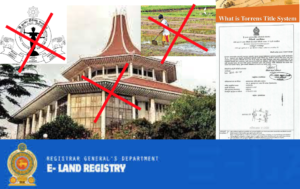Courts – Lawyers & Land Owners omitted in setting up e-Land-Register

The e-registers and the legislative path required to administer the e-register works well in developed nations, because of the effort made by specially trained legal academics who have been specially trained in electronics, registration law and modern property law. They are committed to evaluate the repercussions of the major reforms objectively without looking at the short-term funding and political consideration. In Sri Lanka, the Bar Association was informed suddenly that e-registration will commence with the hybrid foreign law from January 2021. They had to submit their bio-data without any data protection laws to the Registrar of Lands. Courts – Lawyers & Land Owners omitted in setting up e-Land-Register has led to confusion amongst owners and lawyers
As always, Sri Lanka operates with quick fix solutions as soon as funds arrive from foreign agencies without any legal solutions to suite the local land market to build the e register. This has resulted in lawyers being driven to discontinue the existing land laws, create confusion in courts with an extra judicial adjudication process, which had surprisingly limited the judicial authority of the judges.
Result of quick fix solutions lawyers are compelled to follow foreign laws —–
- Repeal of the Common law practiced in the country for over 100 years, has resulted in the repeal of deeds. In lieu of deeds, a set of Instruments used in foreign nations has been introduced as per gazette number 1886 /58 – 31 October 2014.
Who drafted the new instruments for land transactions and who ordered the gazette notification?
Even USA, South Africa and Netherlands continue with the deed system to operate their e-register without the entry of foreign laws in an ad hoc manner.
- Shocking news is that the transition to Instruments will operate the e-register without modern laws and data protection laws.The old colonial laws, the Notaries Ordinance of 1907 that has no law to prevent fraud and the Registration of Documents Ordinance of 1927 where the Registrar has to register valid and invalid forged deeds apply to the e-register. [ Section 7 of Registration of Documents Ordinance of 1927.]
- Equally shocking is that together with the absence of laws to prevent fraud and data protection, the e-land Register is to be governed by Bim Saviya which removes the landowners’ fundamental rights access court if the land owners are affected by fraud.
- Under Bim Saviya – Counsels cannot move forinjunctions & other restraining orders from the Court once lands are registered in the e-land register.
- E-register is a major economic burden to the government.The government has to maintain a STATUTORY FUND to pay compensation to owners in lieu of access to court. For example, if A loses his land ownership right with the registration of a forged deed then A’s solution is to obtain compensation from the Government but not have his/her land returned.
Can the government compensate the value of land?
- Another major problem for land owners. is having to spend for 2 survey plan. Cadastral plans drawn to be registered in the e-land register excludes what is on the ground, such as plantation buildings etc. The local authorities therefore refuse to accept the plans drawn under the cadastral system. Land owners end up having to spend for 2 survey plans – one for the e-land register and one for the local authority, otherwise banks refuse to give loans.
- The e register does not register the rights of ownership that are practiced for centuries by local farmers.
The rights that cannot be registered are:
* Ande cultivation – a system to own paddy land
* Right of pre-emption, essential for lands in Northern province to eliminate crop production being discontinued
* co-ownership rights of inheritance and rights required for chena cultivation
* planters share Tatamaru possession,
* water rights to wells,
* legal rights required for chena cultivation
1.9million people could not enter the register accordingly says the Title Commissioners Report 2018.
The World Bank had confirmed in its World Bank’s ICR Reports that ‘Sri Lanka’s title project is a failure as only titles for parcels with clear land rights were issued.
Titles could not be issued for problem parcel lands and no one was keen to solve the problem.
Adjudication systems were also not improved to provide a solution. http://documents1.worldbank.org/curated/en/996161474635250504/pdf/000020051-20140617135844.pdf
- Since the old colonial law governing the e-register does not make the e-register a compulsory register to register all ownership rights in the country, the hybrid law & e register will be not conclusive.
Before putting the cart before the horse, Sri Lanka’s land lawyers must research &revise the laws with the following simple changes. Foreign laws will take over 100 years to fully implement.
Foremost is that Sri Lanka must simply stop implementing land law changes simply because it comes with a carrot of dollars.
- Enhance the value of the currently used deed system incorporating changes as given in the 2006 Electronic Transaction Act 19. USA, Netherlands and South Africa have improved the deed system to operate the e register. Thy have not introduced foreign laws like Sri Lanka.
- Repeal the foreign law introduced by Act 21 of 1998. It is a copy and paste of 1858 Australian Torren Law, without any of the amendments that are currently passed in Australia to prevent land fraud and protects data.
- Accommodate all land ownership rights of farmers, personal laws and Chena cultivators to the e register.
- Protect land owner’s data.The foreign law will destroy notarised instruments This should not be allowed. No modern laws or biometric laws should be allowed to destroy data. Data must be protected. Repeal Section 7 of the Registration of Documents Ordinance.
- Introduce legal education – Research Centre (for lawyers/ Officials handling land matters) regarding e-registration with future technology changes & automation of land registries with improved deeds, new property law as in other nation which practice Common Law. Even many states in the USA have rejected Bim Saviya and wish to continue with deed system primarily because the bim saviya repeals fundamental rights of land owners.
The above article is written having consulted a Senior Lawyer specialized in Electronic Conveyancing, Digitalisation of land registries, registration system of other nations specifically of USA, Australia [Bim Saviya], UK, India and Malaysia, contributing to several publications & public presentations nationally & internationally.
The Government must learn to not only tap such legal luminaries but nurture more by extending the syllabuses of the Faculty of Law and Law College to draw up the land laws of Sri Lanka and not depend on foreigners to do so.
Sri Lanka does not require to be running a relay or be in competition with itself to implement changes without legal consideration of their ramifications & repercussions.
Everything is being rushed into implementation – ex: new Constitution etc …. Why?
Why are we in such a hurry to please or appease the foreigners without realizing the damage we are doing to the country & our People as a result.
Shenali D Waduge







